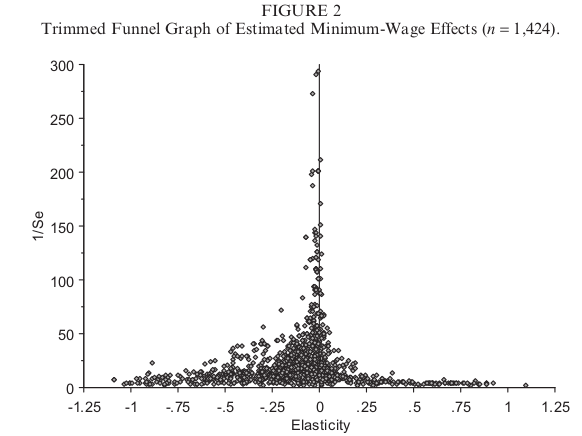February 26, 2013
In a full page ad in today’s Politico, the conservative Employment Policies Institute (not to be confused with the progressive Economic Policy Institute) claims that “85 percent of the most credible economic research from the last 20 years” demonstrates that the minimum wage “reduces opportunities for the least-skilled jobseekers.” In making that claim, the Employment Policies Institute cites research published by economists David Neumark and William Wascher in 2007.
The problem here is that Neumark and Wascher make a decidedly subjective selection of studies to draw their conclusion. We actually have objective evaluations of the full body of recent minimum wage research and these point strongly in the direction of no significant effects on employment.
In their analysis,* Neumark and Wascher reviewed 102 studies of the minimum wage, 33 of which they declared “credible.” Of the 102 studies examined, only 53, however, used data for the United States, which would seem to be an important criteria for evaluating the employment impact here. Of these 53 U.S. studies, 19 earned the rating of “credible” from Neumark and Wascher. But, fully five of these 19 — more than one-fourth — were ones that Neumark and Wascher had conducted themselves. This raises real questions about the objectivity of Neumark and Wascher’s evaluations.
Neumark and Wascher are long-time opponents of the minimum wage. I have, for a long-time, been a supporter of regular, moderate increases in the minimum wage. So, who are you going to believe? Well, fortunately, we have statistical techniques designed to use objective criteria to sift through and evaluate situations where there are a large number of separate statistical studies on the same topic. These “meta-study” techniques are widely used in medicine, for example, where they help doctors to draw more reliable results from a large number of clinical studies than is possible from any individual study.
In a 2009 paper (behind a paywall) in the peer-reviewed, British Journal of Industrial Relations, Hristos Doucouliagos and T.D. Stanley report the results of their meta-study of 64 studies of the effects of the minimum wage on teenage employment in the United States. The chart below, taken from their paper, presents their key finding. The estimated employment effects, which are displayed along the x-axis, include both negative and positive values. Following standard statistical procedures, however, the researchers have also weighted each estimate by its statistical precision, which is measured on the y-axis. The higher up an estimate lies, the more precise it is.
What is most striking about the chart is that all of the most precise estimates are at or very close to zero — the point where the minimum wage has no effect on teen employment.
Doucouliagos and Stanley’s more objective approach leads them to conclude that the minimum wage has “an insignificant employment effect (both practically and statistically).” And these results do not depend on anyone’s subjective judgment of the “credibility” of the underlying studies.
[*I refer here to the 2006 National Bureau of Economic Research version of their paper, which is available for download here behind the NBER’s paywall or here, for free, at the American Enterprise Institute’s website. I don’t believe that there are any differences between this analysis and the one published in 2007 in Foundations and Trends in Microeconomics and cited in the Employment Policies Institute ad.]







